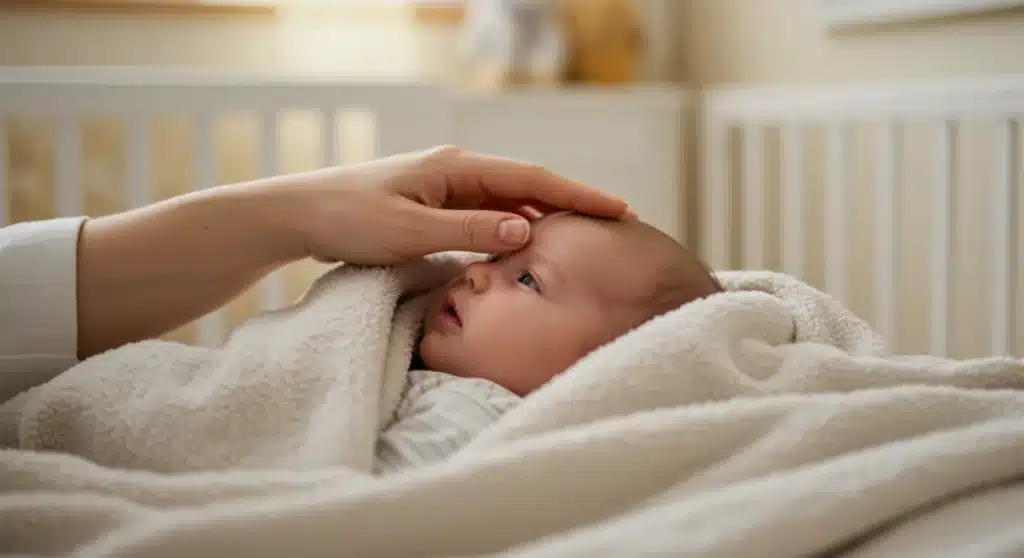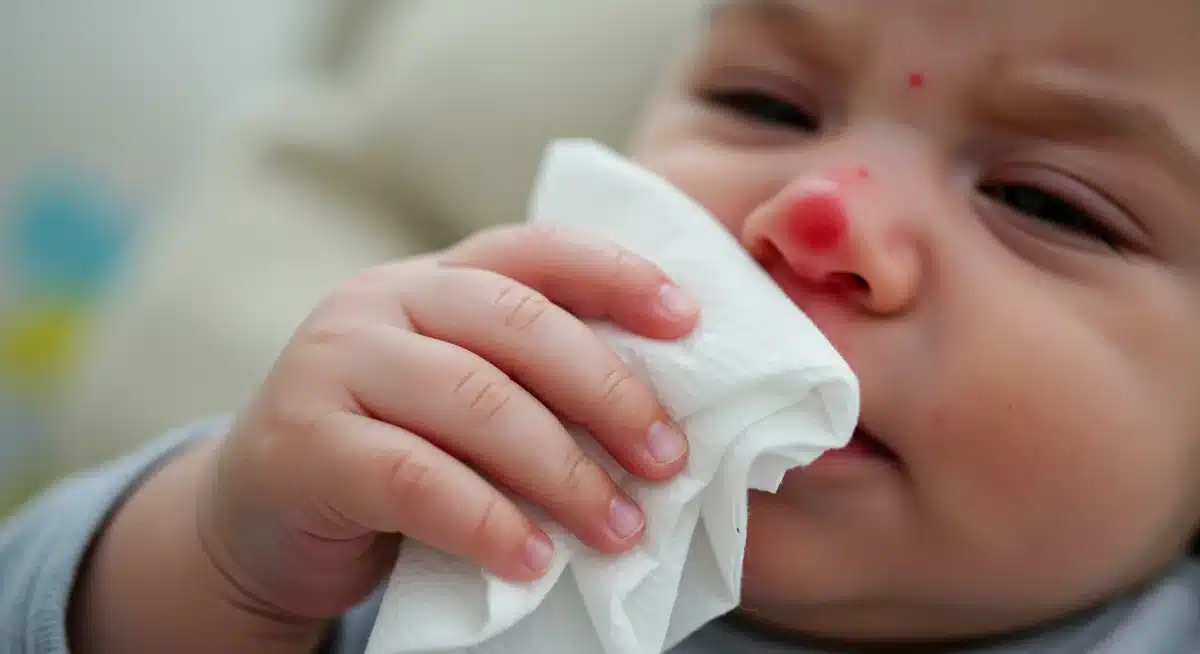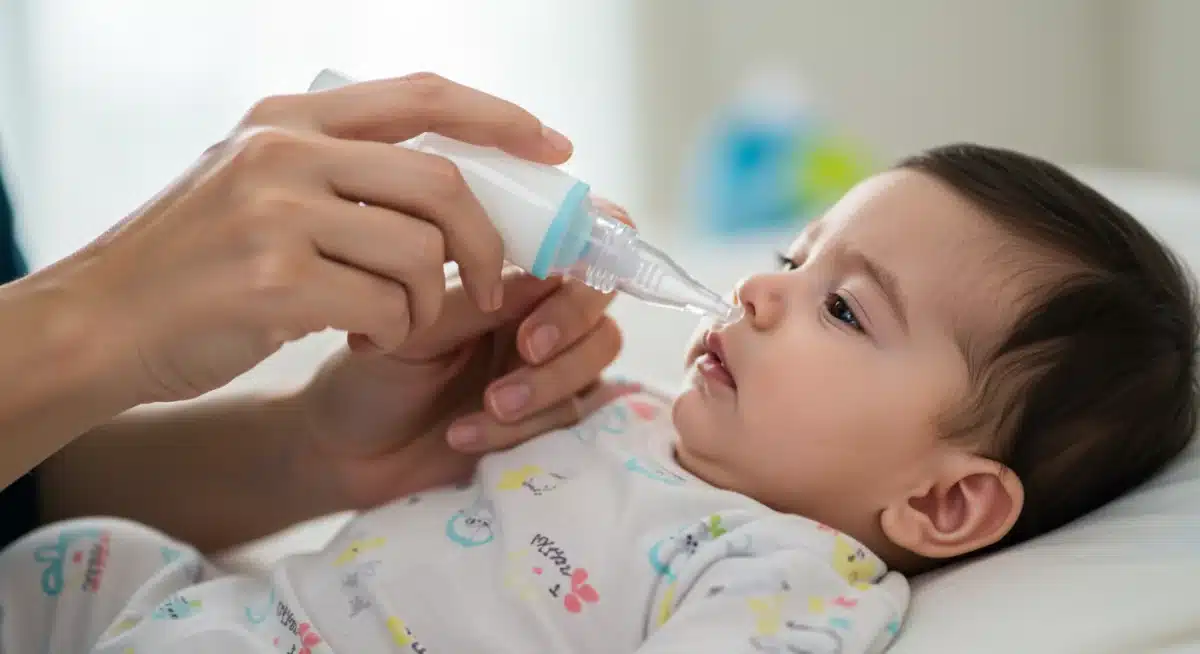Baby’s First Cold: Remedies, When to Seek Medical Advice

Advertisement
Understanding the nuances of baby’s first cold involves recognizing symptoms, applying safe home remedies, and knowing precisely when professional medical intervention becomes necessary to safeguard their delicate health.
Experiencing your baby’s first cold can be a challenging time for any parent, filled with worry and uncertainty. It is essential to be prepared and informed on how to effectively manage symptoms and when to seek professional medical advice. This guide aims to empower you with the knowledge to confidently navigate your baby’s first cold, ensuring their comfort and speedy recovery.
understanding baby cold symptoms
When your little one first catches a cold, recognizing the early signs can help you respond quickly and effectively. Unlike adult colds, infants often express their discomfort differently, making it crucial for parents to be vigilant and observant. A common cold in babies is typically caused by viruses, leading to a range of symptoms that can vary in intensity. Observing these changes carefully will be your first step in providing appropriate care.
Advertisement
It’s important to remember that while colds are common, especially in infants attending daycare or with older siblings, their developing immune systems mean they can be more susceptible and experience symptoms more intensely than adults. Understanding the specific indicators will help you differentiate a simple cold from something more serious.
initial signs of a cold in infants
The very first indications of a cold in your baby might be subtle. You might notice slight changes in their behavior or feeding patterns before more overt physical symptoms appear. Being attuned to these early cues can help you start home remedies promptly.
- Runny Nose: Often starts clear, then thickens and may become yellowish or greenish.
- Sneezing: Frequent sneezing is a common reflex to clear nasal passages.
- Mild Cough: Usually dry at first, potentially worsening at night.
- Fever: Low-grade fever (under 100.4°F or 38°C) can be present, especially in younger infants.
behavioral changes to watch for
Beyond physical symptoms, your baby’s behavior can offer significant clues about their discomfort. They might become fussier or more lethargic than usual. These changes are their way of communicating that they are not feeling well.
Advertisement
They may also show a decreased appetite, refusing to feed as readily as usual, or have difficulty sleeping due to congestion. These behavioral shifts, when combined with physical symptoms, paint a clearer picture of their condition. Keeping a log of when symptoms started and their severity can be helpful if you need to consult a doctor.
Understanding these symptoms is the foundational step in navigating your baby’s first cold. Early recognition allows for prompt and gentle care, which can significantly ease their discomfort and potentially shorten the duration of the cold. Always trust your instincts as a parent; if something feels off, it’s worth investigating further.
effective home remedies for baby’s cold
Once you’ve identified that your baby has a cold, the next step is to implement safe and effective home remedies to help alleviate their symptoms. While there’s no cure for the common cold, these measures can provide much-needed comfort and support their recovery. The goal is to keep your baby as comfortable as possible, ensuring they get enough rest and hydration.
These remedies focus on clearing congestion, soothing irritation, and maintaining overall well-being. It’s crucial to avoid over-the-counter cold medicines for infants unless specifically directed by a pediatrician, as many are not safe for young children and can have serious side effects.
clearing nasal congestion
A stuffy nose is one of the most bothersome symptoms for a baby, as it can interfere with feeding and sleeping. Gentle methods to clear their nasal passages are highly effective and safe.
- Saline Nasal Drops: Use a few drops of saline solution in each nostril to loosen mucus, then wait a few seconds.
- Nasal Aspirator: After using saline, gently use a bulb syringe or a specialized nasal aspirator to suction out the loosened mucus. Do this before feeding and sleeping.
- Humidifier: A cool-mist humidifier in their room can add moisture to the air, helping to thin mucus and ease breathing. Ensure it is cleaned regularly to prevent mold growth.
comfort and hydration strategies
Keeping your baby hydrated and comfortable is paramount when they have a cold. Dehydration can worsen symptoms and delay recovery, while comfort promotes rest, which is essential for healing.
Offer frequent feedings, whether breast milk or formula, as these provide both hydration and nutrients. For older babies, small sips of water can be introduced, but breast milk or formula remains the primary source of fluids. Ensure your baby is dressed appropriately to prevent overheating or getting too cold, and provide plenty of opportunities for rest.
A warm bath can also be soothing and help with congestion. The steam from the warm water can temporarily clear nasal passages, providing a brief period of relief. Gentle massages can also help relax a fussy baby. Remember, patience and consistent care are your best tools in helping your baby through their first cold.
when to seek medical advice for your baby
While most baby colds can be managed at home with supportive care, it is vital for parents to know when symptoms indicate a need for professional medical attention. Recognizing these warning signs can prevent complications and ensure your baby receives the necessary treatment promptly. Trusting your parental instincts is key; if you are ever in doubt, it is always best to consult with a healthcare professional.
Infants, especially newborns, have developing immune systems, which means they can sometimes react differently to illnesses than older children or adults. What might seem like a minor symptom in an adult could be more serious for a baby. Therefore, being proactive and informed about when to seek help is a critical aspect of navigating baby’s first cold.
red flag symptoms requiring immediate attention
Certain symptoms should never be ignored and warrant an immediate call to your pediatrician or a visit to the emergency room. These are indicators that your baby’s condition might be more serious than a common cold.
- High Fever: For infants under 3 months, any fever (rectal temperature of 100.4°F or 38°C or higher) requires immediate medical evaluation. For older babies, a fever accompanied by other severe symptoms or lasting more than a few days should also be checked.
- Difficulty Breathing: Signs include rapid breathing, flared nostrils, grunting sounds, or retractions (skin pulling in between ribs or above the collarbone with each breath).
- Poor Feeding/Dehydration: Fewer wet diapers than usual, lack of tears when crying, dry mouth, or sunken soft spot on the head are signs of dehydration.
- Persistent Cough: A cough that is severe, barking, or accompanied by wheezing, or that lasts for an extended period, especially if it interferes with feeding or sleeping.
- Unusual Drowsiness or Irritability: If your baby is unusually lethargic, difficult to rouse, or inconsolably irritable.
- Bluish Lips or Skin: This is a critical sign of insufficient oxygen and requires immediate emergency care.
when to contact your pediatrician
Even if your baby doesn’t exhibit the immediate red flag symptoms, there are still situations where a call to your pediatrician is advisable. These are often situations where symptoms persist, worsen, or cause significant concern.
Contact your doctor if your baby’s cold symptoms do not improve after several days, or if they seem to be getting worse. Any ear pulling or excessive crying could indicate an ear infection, a common complication of colds in infants. If you notice a rash, or if your baby develops conjunctivitis (pink eye), these also warrant a medical consultation. Always err on the side of caution when it comes to your baby’s health; a quick phone call can provide peace of mind or prompt necessary intervention.
preventative measures and healthy habits
While it’s nearly impossible to completely prevent your baby from ever catching a cold, implementing certain preventative measures and fostering healthy habits can significantly reduce their risk and severity. A proactive approach to hygiene and environmental factors plays a crucial role in safeguarding your infant’s delicate immune system. These strategies are not just about avoiding illness but also about promoting overall wellness for your growing family.
Creating a clean and healthy environment, combined with good personal hygiene practices, forms the cornerstone of cold prevention. Educating other family members and caregivers on these practices is equally important, as they can inadvertently introduce germs into your baby’s environment.
hygiene practices for parents and caregivers
Frequent and thorough handwashing is perhaps the most effective way to prevent the spread of cold viruses. Viruses can survive on surfaces for hours, and hands are common carriers. Establishing a strict handwashing routine for anyone who interacts with your baby is paramount.
- Wash Hands Frequently: Use soap and water for at least 20 seconds, especially after coughing, sneezing, changing diapers, and before feeding.
- Use Hand Sanitizer: When soap and water are not available, use an alcohol-based hand sanitizer with at least 60% alcohol.
- Avoid Touching Face: Encourage everyone to avoid touching their face, especially their nose, mouth, and eyes, to prevent germ transfer.
- Clean and Disinfect Surfaces: Regularly clean and disinfect frequently touched surfaces and toys, especially if someone in the household is sick.
boosting baby’s immunity and environment
Beyond hygiene, supporting your baby’s immune system through healthy habits and controlling their environment can make a significant difference. Breastfeeding, if possible, provides crucial antibodies that protect against various infections, including colds.
Ensure your baby gets adequate rest, as sleep is vital for immune function. Avoid exposing your baby to cigarette smoke, which can irritate their respiratory system and make them more susceptible to respiratory illnesses. Limiting exposure to large crowds, especially during cold and flu season, can also help reduce their chances of encountering viruses. A well-ventilated home environment can also prevent the buildup of airborne germs. These collective efforts create a robust defense against common illnesses, helping your baby stay healthy and thrive.
common misconceptions about baby colds
When your baby has a cold, it’s easy to fall prey to common misconceptions or old wives’ tales that can sometimes do more harm than good. Dispelling these myths is crucial for providing effective and safe care, ensuring that your baby’s recovery is based on sound, evidence-backed practices. Understanding what not to do is just as important as knowing what to do during your baby’s first cold.
Many of these myths stem from well-intentioned advice but lack scientific validation. As parents, it’s essential to rely on trusted sources, such as your pediatrician, and current medical guidelines, rather than anecdotal evidence. This approach ensures your baby receives the best possible care.
debunking popular cold myths
One of the most persistent myths is that exposure to cold weather causes colds. In reality, colds are caused by viruses, not temperature. While spending more time indoors during colder months can increase exposure to viruses, the cold itself is not the culprit. Dressing your baby warmly is important for comfort, but it won’t prevent a viral infection.
Another common misconception is that antibiotics can cure a cold. Antibiotics are effective against bacterial infections, but colds are caused by viruses. Using antibiotics unnecessarily can lead to antibiotic resistance and won’t help your baby recover from a viral cold. Always consult a doctor before administering any medication.
what not to do when your baby has a cold
There are several practices that parents should avoid when their baby has a cold, as they can be ineffective or even harmful. These include remedies that might be suitable for adults but are not safe for infants.
- Avoid Over-the-Counter Cold and Cough Medicines: These medicines are not recommended for infants and young children due to potential serious side effects. They do not treat the underlying cause and can sometimes worsen symptoms or cause adverse reactions.
- Do Not Give Honey to Babies Under One Year: Honey can pose a risk of infant botulism for babies younger than 12 months.
- Avoid Vapor Rubs with Camphor: Products containing camphor can be toxic if ingested and may irritate the airways of young children.
- Do Not Force Feed: If your baby has a reduced appetite, forcing them to eat can cause distress. Focus on hydration and offer small, frequent feedings as tolerated.
By avoiding these common pitfalls and focusing on safe, proven remedies, you can help your baby feel better without introducing unnecessary risks. When in doubt, always seek advice from your pediatrician, who can provide personalized guidance based on your baby’s specific needs.
supporting your baby’s comfort and sleep
A cold can significantly disrupt your baby’s comfort and sleep patterns, which are vital for their development and recovery. Creating an environment that promotes rest and provides gentle relief from symptoms is essential. When your baby is uncomfortable, they may become fussy, making it harder for both of you to get the rest needed. Focusing on these aspects will not only help your baby feel better but also aid in their healing process during their baby’s first cold.
A well-rested baby is better equipped to fight off infection, and sleep offers a crucial period for their body to recover. Therefore, prioritizing comfort and sleep management strategies is a key component of cold care.

creating a conducive sleep environment
The sleeping environment plays a significant role in how well your baby rests when they have a cold. Simple adjustments can make a big difference in helping them breathe easier and sleep more soundly.
- Elevate the Head of the Crib: You can slightly elevate the head of the mattress by placing a wedge or firm pillows underneath the mattress (never inside the crib with the baby) to help with drainage and ease breathing.
- Maintain Optimal Room Temperature: Keep the room cool, but not cold, around 68-72°F (20-22°C).
- Use a Humidifier: A cool-mist humidifier adds moisture to the air, which can thin mucus and soothe irritated airways, making breathing more comfortable.
- Ensure Darkness and Quiet: Minimize light and noise to create a peaceful sleeping environment.
soothing techniques for a fussy baby
A baby with a cold can be extra fussy due to discomfort. Gentle soothing techniques can help calm them down and facilitate rest. These methods focus on providing physical and emotional comfort.
Holding your baby upright can sometimes help with congestion and make them more comfortable. Gentle patting on their back can also help loosen mucus in their chest. A warm, comforting bath before bedtime can be very relaxing and the steam can aid in clearing nasal passages. Singing lullabies or reading a soft story can also distract them from their discomfort and help them drift off to sleep. Remember to offer plenty of cuddles and reassurance, as your presence and comfort are invaluable when they are not feeling well.
By combining these strategies, you can significantly improve your baby’s comfort and sleep quality, which are essential for navigating their first cold successfully. A well-rested baby is a happier baby, and a happier baby is on the path to a quicker recovery.
long-term impact and recovery
Understanding the long-term impact of a baby’s first cold and ensuring a smooth recovery process is crucial for their continued health and development. While a common cold is usually a self-limiting illness, its management and the baby’s overall health during this period can influence future susceptibility and immune response. Focusing on complete recovery and maintaining healthy habits will benefit your child well beyond the immediate illness.
The recovery phase is not just about the disappearance of symptoms; it’s about ensuring your baby regains their full strength and vitality. This period also presents an opportunity to reinforce healthy practices that can help prevent future illnesses and build a stronger immune system.

ensuring a full recovery
After the most acute symptoms of the cold subside, it’s important to continue supportive care to ensure a full recovery. Your baby might still be a bit tired or have a lingering cough for a few days, which is normal. Gradually reintroducing their regular routine and monitoring their energy levels and feeding habits are key.
- Continue Hydration: Ensure your baby continues to receive ample fluids, whether breast milk, formula, or water for older infants, even after symptoms improve.
- Monitor Lingering Symptoms: Keep an eye on any persistent cough or congestion. If these symptoms last for more than a week or two, or if they worsen, consult your pediatrician.
- Gradual Return to Activity: Allow your baby to slowly return to their normal play and activity levels, ensuring they don’t overexert themselves too soon.
- Adequate Rest: Continue to prioritize good sleep hygiene to support their immune system and energy restoration.
building long-term immunity and resilience
Every cold your baby experiences, while uncomfortable, contributes to the development of their immune system. Each exposure to a new virus helps their body learn to fight off infections more effectively in the future. Beyond this natural process, there are ways to actively support their long-term immunity.
Maintaining a balanced diet for older infants and continued breastfeeding for younger ones provides essential nutrients and antibodies. Ensuring your baby gets regular physical activity, once they are old enough, also supports overall health. Limiting exposure to environmental toxins, like secondhand smoke, is crucial for respiratory health. Regular check-ups with your pediatrician help monitor their growth and development and ensure they receive all necessary vaccinations, which protect against more serious illnesses. By focusing on these aspects, you’re not just helping your baby recover from their current cold, but also laying the foundation for a healthier, more resilient future.
| Key Aspect | Brief Description |
|---|---|
| Symptom Recognition | Identify early signs like runny nose, sneezing, mild cough, and behavioral changes. |
| Home Remedies | Use saline drops, nasal aspirators, humidifiers, and ensure hydration and comfort. |
| Medical Consultation | Seek advice for high fever (under 3 months), breathing difficulties, or severe symptoms. |
| Prevention | Practice good hygiene, breastfeed, ensure rest, and avoid smoke exposure. |
frequently asked questions about baby colds
A baby’s cold usually lasts about 7 to 10 days. Symptoms might peak around day 3-5 and then gradually improve. However, a lingering cough can sometimes persist for a couple of weeks after other symptoms have resolved.
No, over-the-counter cold and cough medicines are generally not recommended for infants and young children due to potential serious side effects. Always consult your pediatrician before administering any medication to your baby.
The most effective method involves using saline nasal drops to loosen mucus, followed by gentle suction with a nasal aspirator. A cool-mist humidifier can also help by adding moisture to the air, making breathing easier.
For infants under 3 months, any fever (rectal temperature of 100.4°F or 38°C or higher) requires immediate medical attention. For older babies, high fever or fever accompanied by severe symptoms warrants a doctor’s visit.
Yes, breastfeeding provides essential antibodies and immune factors that can help protect your baby from various infections, including colds, and can also help them recover more quickly if they do get sick.
conclusion
Navigating your baby’s first cold can undoubtedly be a stressful experience, yet with the right knowledge and a calm approach, you can provide effective comfort and care. Understanding the subtle signs of illness, implementing safe home remedies, and knowing precisely when to seek medical advice are cornerstone principles for any parent. Remember that your proactive care, combined with a supportive and hygienic environment, plays a crucial role not only in their immediate recovery but also in building their long-term resilience. Always trust your instincts, and do not hesitate to consult your pediatrician for any concerns, ensuring your little one receives the best possible care during this common developmental milestone.





